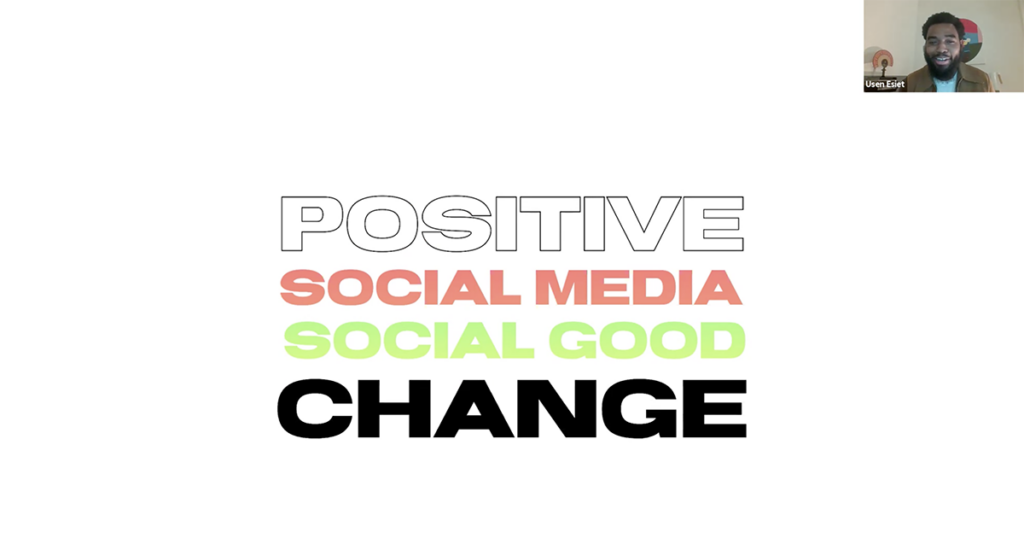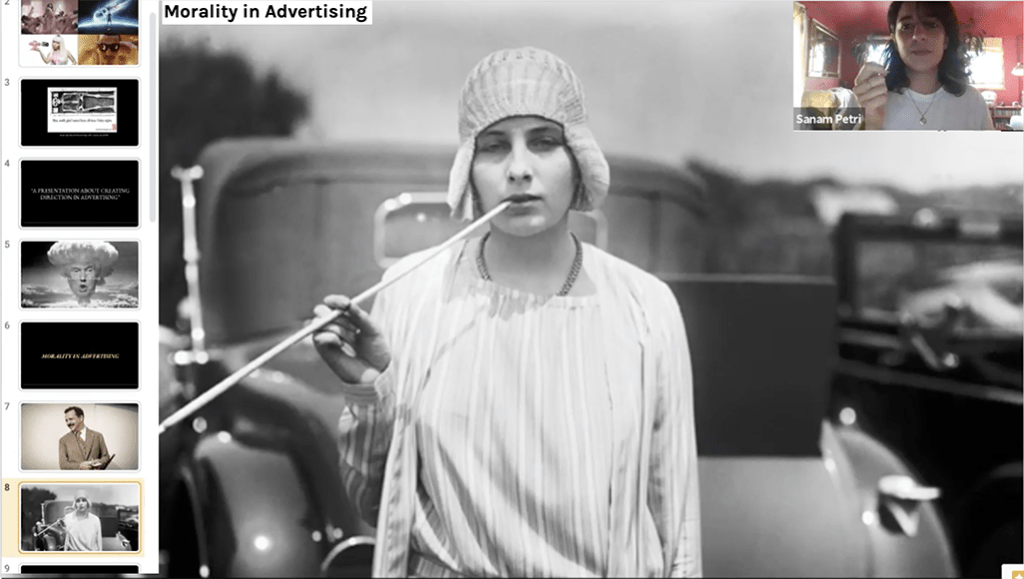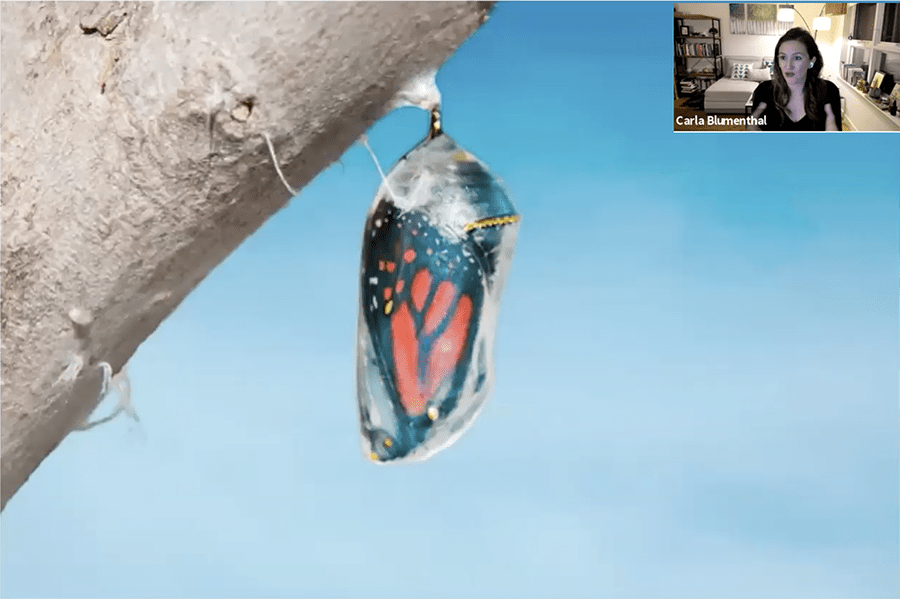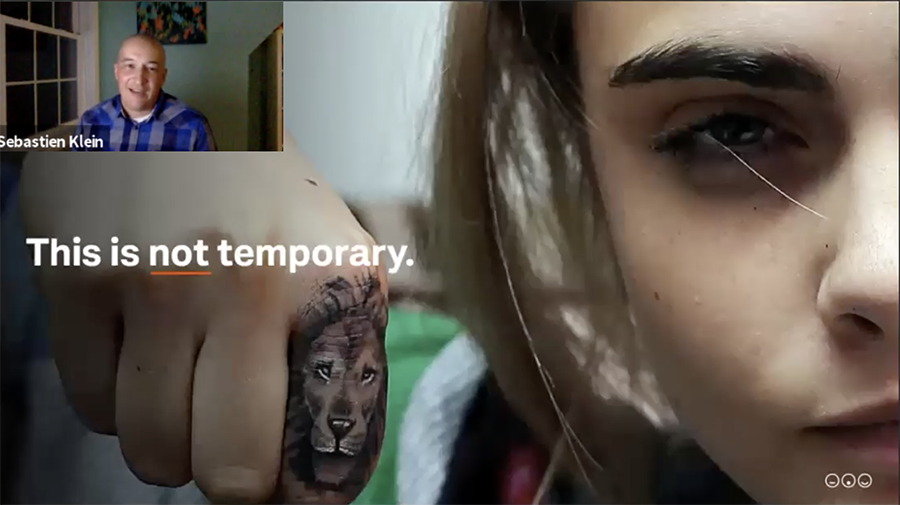On Becoming a Changemaker: Insights from Alumni

By Francisco Miranda de Sousa, MA ’20
In the midst of this unusual semester, the new graduate students in the Strategic Marketing Communication (SMC) program collaborated in an introductory course that covers the basics of creating and implementing an integrated marketing plan. As part of this course, Professor Thomas Vogel (who teaches topics in the “creating” arena) and affiliated faculty member Mark Dockser (on the “planning” side of things) invited Emerson alumni to an online panel discussion.
Students not only learned from the fascinating work of creative directors and entrepreneurs, but also the valuable lessons on managing uncertainty with mental resilience, adaptability, and flexibility.
Using last year’s edition as a model, Vogel and Dockser aimed to focus the event on inspiring students to become changemakers, in addition to good marketers.
“This year we heard much more about the use of transformational skills and experiences to be the best human being we can be,” says Vogel. “I think the human being comes first, and we can all be changemakers. So it’s about how we can empower everyone to step into the best opportunities and build the appropriate confidence to take on risks.”
Changemaking starts at a personal level
The panel talked about the drive to connect to a deeper purpose — a set of values that will guide students when they step into the professional world. Sanam Petri, MA ’06 kicked off with a discussion about morality in advertising:
“Right now, it’s a really weird time to be alive. And I think as advertisers, as marketers, it’s been hard to find meaning in what we do, and it’s been hard to be a person who’s awake with a conscience and still be working in a corporation that’s communicating en masse to people,” said Petri, an independent creative director whose clients include Fortune 500 companies and Grammy-winning artists. “So the question is, even if you start from a place where you’re on sort of shaky ground, as the person who is a part of the mix, can you take what you know and what you understand to be right to push things towards being in a better place?”

Finding the courage to speak up and contribute with novel ideas is another stepping stone towards encouraging others to become changemakers. Jill Goddard, MA ’09, director of public relations and communications at Boston Ballet, shared her thoughts on taking initiative, especially when it requires to step out of the comfort zone.
“Raise your hand, add value to the conversation, even if it’s outside of your everyday scope of work or even your comfort zone,” Goddard said.
Besides the positive impact that speaking up has on our professions, the personal reward according to Goddard is also clear: “Some of the proudest projects I’ve ever worked on, I raised my hand usually because no one else wanted to do it, especially if it was just as unsexy as an annual report or writing a grant.”
The importance of finding and playing your role
Usen Esiet, MA ’12, a social media analyst for the United Nations Population Fund, reinforced the importance of finding a specific role to play when leading changes at a large scale.
“Change is a very elusive idea,” he said. “If we all knew how to change the world, the UN probably wouldn’t exist. We’re all trying to figure out how to bring about positive change. And everyone is a changemaker, regardless of the line of work that you do. I think it’s just understanding what role you have to play.”
As Esiet explains, “Social media is a tool that I use for good. To me, it’s just about bringing about positive change, whether it’s change at a global level, at a community level, or just changing someone’s life.”
At the UN, Esiet has played a key role in generating awareness about several global issues, including the call to end the practice of female genital mutilation (FGM) in developing countries. For him, the key to encourage change is storytelling.
“Storytelling saves lives. Unless people’s stories are told and their voices are heard, they’ll remain marginalized and continue to suffer in silence because their rights are being undermined and their lives will remain at risk. So it’s not just the power of the story in and of itself, but the purpose that it can serve.”

He added that the impact and success of storytelling also depends on getting the right perspective on the story.
“We’re definitely not the only people who are raising attention, but we haven’t seen the movement become a global phenomenon, primarily because the stories were not being told,” he explained. “I think one of the powerful things to do is to give people hope. The people we film in our campaign are not hopeless and helpless. They may suffer, but they’re survivors. That’s something that I think you should always take with you.”
Petri also commented on the power of storytelling as a means to generate change, and believes that with that power comes a certain level of responsibility.
“That’s the thing that I wish that I knew when I was in school.” Petri explained. “What we know how to do is so powerful — to communicate to large swaths of people at once and get them to take action. You have to be really aware of that power and try to use it for good as much as you can and support each other in that endeavor.”
Reinventing is the new normal
The coronavirus pandemic has often been described as an accelerator or accentuator of already-present situations. Likewise, the pandemic has accentuated efforts in Emerson’s SMC program towards preparing students to become changemakers, particularly through entrepreneurship and innovation.
As students progress with their classes, Vogel and Dockser believe it’s important to remind them to keep an open mind when applying these skills to the professional world, and they both propose entrepreneurship as an alternative to job hunting.
High performance coach Carla Blumenthal, MA ’09 exemplifies the values of creativity, entrepreneurship, and growth mindset that now characterize the new twist in the SMC curriculum.
Blumenthal addressed the students with an encouraging opening statement for students: “Your success is really connected to your ability to evolve, and right now, you’re learning amazing foundational skills at Emerson, especially in the context of today’s world. And when you graduate, you’re going to take all of that knowledge and apply it to an ever dynamic world. So your personal ability to spot opportunities and evolve is really connected to your success and to one of our greatest skills, which is reinvention.”

Blumenthal added that “reinvention is the proactive and intentional practice of integrating your past selves, your past skills and past experiences, to create a new identity and path moving forward.” She then how reinvention can work for students and young professionals.
One one hand, students should aim to optimize for learning without an attachment and keep an open mind to wherever the journey might take them, through “side projects, side hustle, or receiving personal coaching.” Going through these learning experiences “will provide students with clues about their next-level skills, desires and passions that will support them in reinventing themselves.”
On the other hand, Blumenthal adds, students could benefit from learning how to normalize the mess.
“Reinvention itself is inherently messy and full of questions, fears, and challenges. You aren’t always going to have the answers.” In the process of reinvention, however, “you are inherently stripping away all the layers of your identity. So you can rebuild in a new direction.”
The cost of becoming a changemaker
Alumni panel discussions allow students to learn first-hand the journey of a changemaker and gain perspective on the benefits and the cost. Esiet was asked how he sleeps at night knowing there’s such devastation and hardship around the globe. He responded with a friendly smirk: “I usually don’t sleep. And that’s probably because I’m doing too much work and everything.
“To be quite frank, it’s easy to be disillusioned, to throw your hands in the air and give up. But I meant what I said: Everyone has a role to play. When you know that there are real people whose lives are impacted by the work you do…you wake up every day with a purpose.”
Considering cost in a different sense, student Cassie Brown asked Petri if he was ever in a situation where his values didn’t align with what he was being asked to do.
“You have to ask yourself what is the personal cost to you, emotionally, mentally, spiritually and financially,” Petri said. “At the same time, you have to be able to evaluate what is the rate of change that you will be able to affect in that position, according to what you need to get done. So if being in that place means that you’re in a position to open the door to other minorities, you’re essentially weighing that against the toll. If you can be in a place where you are a representative, if being that person in that environment is causing things around you to change for the better and you can deal with that, I think that’s a gift. But it also comes at a personal cost and only you can understand how much protection you need to be giving yourself to be able to survive in those environments.”
The road ahead
“During 2020, plans were salvaged, we pivoted, and the outcomes were unknown,” said Sebastien Klein, MA ’06, vice president of strategy at Jack Morton Worldwide. “We were all learning. But next year there is a lot of pressure. From a design standpoint, we have to scenario-plan and execute in a way that is sort of agile.”
In this new normal, Klein believes that “we need to be able to quickly pivot, maybe a big roadshow is no longer a single one size fits all solution. Today you kind of have to plan for all possible eventualities.”

Categories